Daily Vocabulary Words: List of Daily Used Words
Hi there. Welcome to this special section @ Wordpandit.
Our endeavour here is straightforward: highlighting important daily vocabulary words, you would encounter in The Hindu. This is your repository of commonly used words; essentially, we are posting a list of daily used words. Hence, this has significant practical application as it teaches you words that are commonly used in a leading publication such as The Hindu.
Visit the website daily to learn words from The Hindu.
WORD-1: Aspirationally
CONTEXT: It seems logical to stick to the aspirationally high but achievable standards suggested by the WHO-MGRS.
SOURCE: The Hindu
EXPLANATORY PARAGRAPH: Aspirationally refers to doing something in a way that reflects your hopes or ambitions for the future. It’s like when you work hard to achieve your dreams and make choices that align with your goals.
MEANING: In a manner that reflects hopes, ambitions, or aspirations for the future (adverb).
PRONUNCIATION: uh-spuh-RAY-shuh-nuh-lee
SYNONYMS: Ambitiously, optimistically, hopefully, inspiringly, idealistically
USAGE EXAMPLES:
1. She approached her career aspirationally, aiming for leadership roles.
2. The company’s policies were designed aspirationally to promote innovation.
3. He spoke aspirationally about his plans to make a positive impact on society.
4. The school encouraged students to think aspirationally about their future careers.
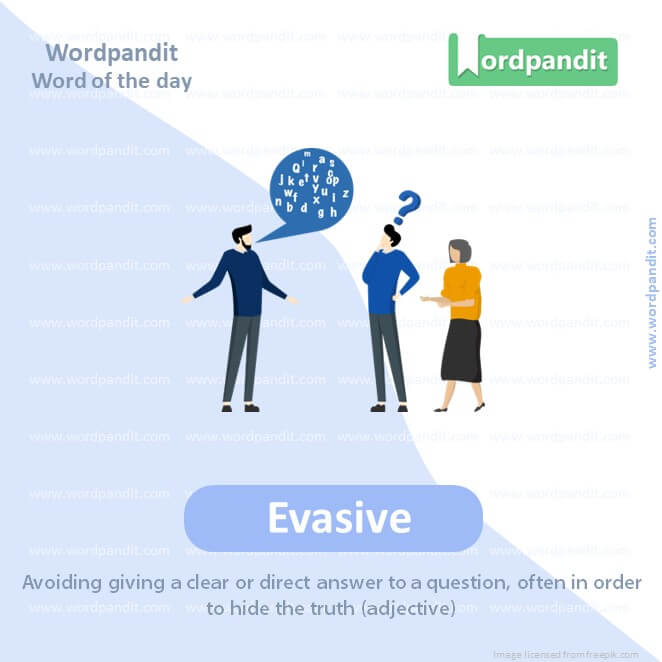
WORD-2: Evasive
CONTEXT: Mr. Siddaramaiah was evasive when asked if the restriction would be lifted this academic year.
SOURCE: The Hindu
EXPLANATORY PARAGRAPH: Evasive means avoiding something, especially answering questions directly or providing clear information. It’s like when you dodge a ball during a game or avoid talking about a topic you don’t want to discuss.
MEANING: Avoiding giving a clear or direct answer to a question, often in order to hide the truth (adjective)
PRONUNCIATION: ih-VEY-siv
SYNONYMS: Elusive, evading, dodging, ambiguous, unclear
USAGE EXAMPLES:
1. The politician’s answers during the interview were evasive and did not address the questions directly.
2. She became evasive whenever someone asked about her past.
3. The suspect’s evasive behavior raised suspicions among investigators.
4. His evasive responses indicated that he was hiding something.
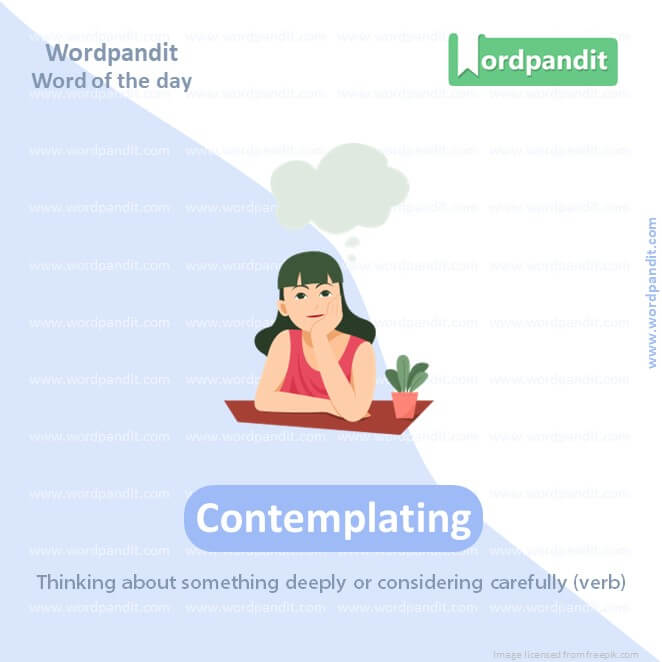
WORD-3: Contemplating
CONTEXT: He said that his government was only “contemplating” such a move and that the matter required further deliberation.
SOURCE: The Hindu
EXPLANATORY PARAGRAPH: Contemplating means thinking deeply or considering something carefully. It’s like when you ponder a question before answering it or spend time reflecting on a decision.
MEANING: Thinking about something deeply or considering carefully (verb).
PRONUNCIATION: KON-tuhm-pley-ting
SYNONYMS: Pondering, reflecting, considering, meditating, deliberating
USAGE EXAMPLES:
1. She sat quietly, contemplating her next move in the chess game.
2. He spent hours contemplating the meaning of life.
3. The artist stood in front of the canvas, contemplating her next masterpiece.
4. Contemplating the consequences, he decided to take a different approach.
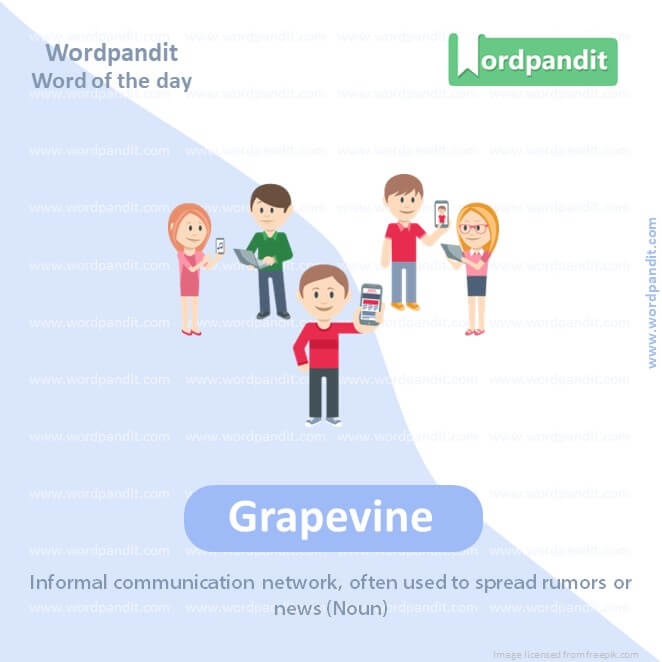
WORD-4: Grapevine
CONTEXT: The grapevine is that the Chief Minister has been nudged by the leaders at the Centre not to touch the “sensitive” issue while the case is pending before the Supreme Court and especially before the Lok Sabha elections.
SOURCE: The Hindu
EXPLANATORY PARAGRAPH: Grapevine refers to informal channels of communication, especially rumors or gossip that spread among people. It’s like when news travels through word of mouth rather than official sources.
MEANING: Informal communication network, often used to spread rumors or news (Noun)
PRONUNCIATION: greyv-vahyn
SYNONYMS: Gossip, hearsay, rumor mill, informal communication, word of mouth
USAGE EXAMPLES:
1. Information about the merger spread quickly through the company grapevine.
2. The grapevine was abuzz with rumors about changes in management.
3. She heard about the party through the grapevine and decided to attend.
4. The grapevine often exaggerates stories, so it’s important to verify information.
WORD-5: Fuelled
CONTEXT: This quick spread was in no small measure fuelled by social media and regional news channels.
SOURCE: The Hindu
EXPLANATORY PARAGRAPH: Fuelled means to provide energy or support for something, like adding fuel to a fire to keep it burning. It’s like when you give motivation or resources to keep an idea or activity going.
MEANING: Powered or energized by something (Verb).
PRONUNCIATION: fyoo-uhld
SYNONYMS: Energized, stimulated, encouraged, powered, propelled
USAGE EXAMPLES:
1. The success of the project fuelled their enthusiasm for future initiatives.
2. His passion for music fuelled his determination to become a professional musician.
3. The positive feedback fuelled her confidence in pursuing her goals.
4. The new funding fuelled innovation and growth in the company.
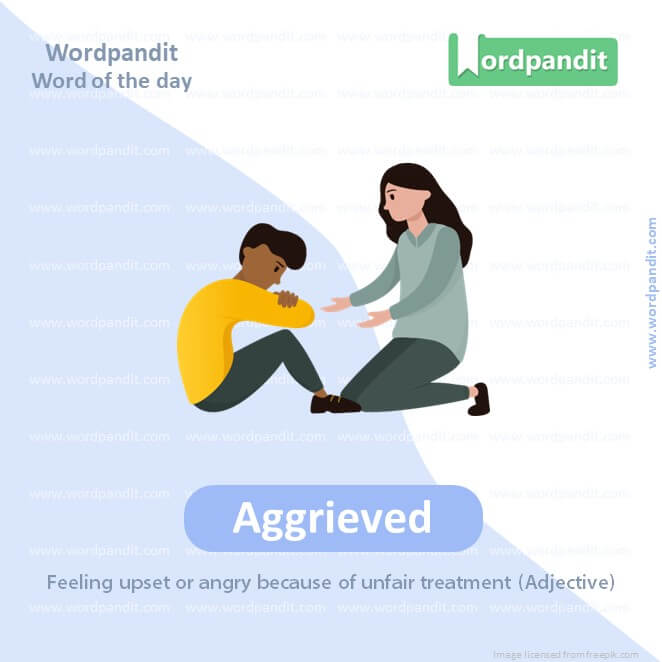
WORD-6: Aggrieved
CONTEXT: Some of the aggrieved students went to the Karnataka High Court, which, in its final judgment on March 15, 2022
SOURCE: The Hindu
EXPLANATORY PARAGRAPH: Aggrieved means feeling resentment or injustice, usually due to a perceived wrongdoing or unfair treatment. It’s like when you feel upset because you believe you’ve been treated unfairly.
MEANING: Feeling upset or angry because of unfair treatment (Adjective).
PRONUNCIATION: uh-GREEVD
SYNONYMS: Offended, wronged, hurt, disgruntled, indignant
USAGE EXAMPLES:
1. The aggrieved employees filed a complaint against the company for discrimination.
2. She felt aggrieved by the decision and sought an explanation.
3. The aggrieved party demanded compensation for damages.
4. His aggrieved tone indicated that he felt wronged by the accusations.
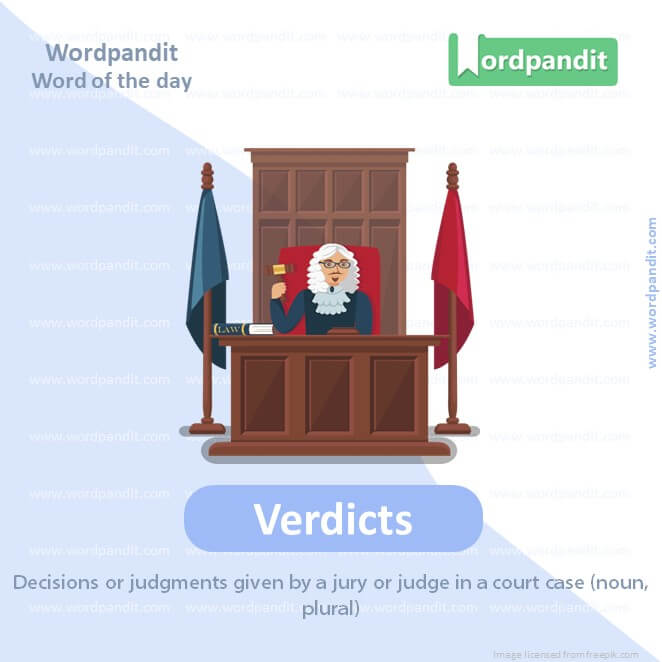
WORD-7: Verdict
CONTEXT: The petitioners then appealed before the Supreme Court, which, on October 13, delivered a split verdict.
SOURCE: The Hindu
EXPLANATORY PARAGRAPH: Verdict refers to the decision or judgment made by a court or jury in a legal case. It’s like when the judge announces whether someone is guilty or not guilty after hearing all the evidence.
MEANING: Decisions or judgments given by a jury or judge in a court case (noun,plural)
PRONUNCIATION: VUR-dikt
SYNONYMS: Judgment, decision, ruling, finding, conclusion
USAGE EXAMPLES:
1. The jury’s verdict was unanimous in favor of the defendant.
2. The court announced its verdict after deliberating for several hours.
3. The verdict of the Supreme Court set a precedent for future cases.
4. The guilty verdict brought closure to the victim’s family.
WORD-8: Imperilled
CONTEXT: People’s Union for Civil Liberties-Karnataka in select towns and villages contended that “a whole generation of young Muslim students’ right to education has been imperilled by the hijab ban.
SOURCE: The Hindu
EXPLANATORY PARAGRAPH: Imperilled means to put something or someone in danger or jeopardy. It’s like when a reckless driver imperils the safety of others on the road.
MEANING: Placed in danger or jeopardy; at risk of harm or damage (adjective).
PRONUNCIATION: im-PER-uhld
SYNONYMS: Endangered, jeopardized, threatened, at risk, vulnerable
USAGE EXAMPLES:
1. The environmentalist warned that deforestation imperilled the habitats of many species.
2. His reckless behavior imperilled the lives of everyone on the road.
3. The economic downturn imperilled the stability of small businesses.
4. Climate change imperils coastal communities with rising sea levels.
WORD-9: Appeasement
CONTEXT: The Congress appears to constantly dread the prospect of the BJP, even as a weakened political force, finding in its every move and gesture an opportunity to brand it an “anti-Hindu” party that indulges in “appeasement” politics.
SOURCE: The Hindu
EXPLANATORY PARAGRAPH: Appeasement refers to the act of trying to satisfy or pacify someone, often by giving in to their demands or desires. It’s like when you offer a treat to calm down a upset friend.
MEANING: The action of satisfying or pacifying someone by giving in to their demands or desires (noun).
PRONUNCIATION: uh-PEEZ-muhnt
SYNONYMS: Pacification, conciliation, placation, accommodation, concession
USAGE EXAMPLES:
1. The policy of appeasement failed to prevent further aggression from the hostile nation.
2. She resorted to appeasement to calm down her upset colleague.
3. Appeasement strategies were used to avoid conflict in the negotiations.
4. Critics argued that appeasement only emboldened the aggressor.
WORD-10 Affiliates
CONTEXT: This fear is not unfounded, since few can beat the BJP and its affiliates in setting the narrative, as has been proved time and again in Karnataka and elsewhere.
SOURCE: The Hindu
EXPLANATORY PARAGRAPH: Affiliates are individuals or organizations that are closely associated with or connected to a larger group or institution. It’s like when branches of a company or members of a club are connected to the main organization.
MEANING: Individuals or organizations closely associated with or connected to a larger group or institution (noun).
PRONUNCIATION: uh-FIL-ee-eyts
SYNONYMS: Associates, members, partners, branches, subsidiaries
USAGE EXAMPLES:
1. The local chapters are affiliates of the national organization.
2. The university’s affiliates include research centers and alumni associations.
3. The company’s affiliates operate in different regions around the world.
4. Affiliates of the political party campaigned together during the election.
Vocabulary Words
When delving into the dynamic world of languages, the grandeur of ‘vocabulary words’ is all-encompassing. The importance of ‘vocabulary words’ in effective communication cannot be overstated; it’s these words that form the backdrop of any language, painting intricate pictures of thoughts and ideas.
Starting on the journey of learning ‘vocabulary words’, one should steer clear from rote memorization. The traditional structure of merely repeating words lacks the necessary context and application that actually embeds these words into your memory. To truly master the ‘vocabulary words’, one needs an integrated, immersive approach.
The first step towards mastering ‘vocabulary words’ is to engage with varied language mediums. Expanding beyond textbooks to read fiction, articles, blogs, and other forms of content not only diversifies your vocabulary but also acts as a mirror to reflect the practical application of these words. Essentially, you’re exposed to the words as they are commonly used, allowing you to truly understand their essence.
Empowering this journey, tech tools like language learning apps and memory-enhancing flashcards significantly aid in learning ‘vocabulary words’. These interactive tools provide a more engaging learning experience and hone word retention. Mnemonic devices, associating words with a unique story or visual image, enrich the process and make memory recall more efficient.
Practicing ‘vocabulary words’ by using them in day-to-day conversations exemplifies learning by doing. It also strengthens the neural pathways and improves overall word recall. This, coupled with regular revisions, ensures your grasp over ‘vocabulary words’ remains strong.
In conclusion, learning ‘vocabulary words’ is not just about adding words to your linguistic cupboard, but understanding their essence and utilizing them effectively. An inclusive approach to learning that combines diverse reading materials, technology tools, mnemonic devices and practice can really propel your mastery over ‘vocabulary words’. Remember, language is the bloodline of communication, and ‘vocabulary words’ are its heartbeat. ‘











